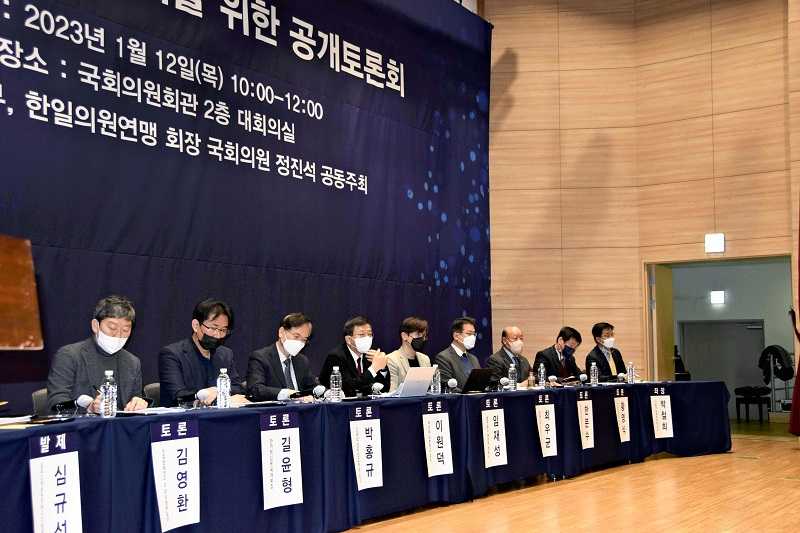
Participants in an open forum discuss the issue of compensation for former requisitioned workers at the National Assembly Members’ Office Building in Seoul on Thursday.
21:00 JST, January 13, 2023
SEOUL — In an open forum on the one of most contentious issues between Japan and South Korea, a high-ranking South Korean government official laid out the details on Thursday for a plan to resolve the conflict over compensation for wartime requisitioned workers from Korean Peninsula.
South Korea has called for using a public benefit foundation, established to support the former requisitioned workers, to pay the compensation, a proposal it hopes will settle the issue once and for all.
The governments of the two countries had previously agreed that the issue had been settled under a 1965 agreement regarding wartime matters between them, but it became complicated when South Korea’s Supreme Court ordered the Japanese companies to pay compensation for the former requisitioned workers and their bereaved families.
On Thursday, Seo Min-jung, director-general for Asian and Pacific affairs at the South Korean Foreign Ministry, explained how the public benefit foundation would be shouldering the burden of reparations. The body, acting on behalf of the Japanese firms, is called the Foundation for Victims of Forced Mobilization by Imperial Japan, .
Should the plaintiffs refuse to accept the money, and the foundation’s funds are allowed to be held in escrow by the court, the matter will be regarded as legally settled, according to South Korean government.
A number of plaintiffs vehemently oppose the proposal, but the South Korean government has concluded that this process does not require their consent. President Yoon Suk-yeol is expected to soon issue his government’s decision.
Regarding funding the foundation, Seo said, “A creative approach is needed.” To placate domestic opposition in South Korea, donations may be solicited from Japanese companies and financial circles to support projects for former requisitioned workers.
“For the foundation to take over the debt, the defendant companies must put in writing that they acknowledge the existence of their financial obligations,” an attorney for the plaintiffs told the media after the forum.
For the defendant Japanese companies to admit to the existence of such an obligation, it would mean accepting the Supreme Court ruling, and that becomes a major stumbling block. That is seen as another issue to be addressed in the future.
The panel debate was opened to the public as part of the Yoon administration’s emphasis on “transparency” in the process of formulating a solution. Before that, a council of experts from the public and private sectors formed last July held four meetings, after which it released a summary of its findings. Foreign Minister Park Jin met with the plaintiffs in September with reporters in attendance.
Yoon had learned the lessons from the 2015 Japan-South Korea agreement on the issue of comfort women, which was criticized for its secret negotiations and exclusion of concerned parties.
The administration of then President Park Geun-hye contacted the former comfort women and their representatives behind the scenes to explain the agreement. But after the announcement of the agreement as “a final and irreversible resolution” of the issue, she was roundly criticized by the public.
Her successor, Moon Jae-in, dissolved the foundation established to support the former comfort women, effectively scrapping the agreement.
Japan govt watching closely
Back in Tokyo, the Japanese government is closely watching the debate in South Korea over a proposal presented by the South Korean Foreign Ministry.
Japan maintains its position that the issue was settled under the 1965 Agreement on the Settlement of Problems Concerning Property and Claims and Economic Cooperation, and stands firm in rejecting financial contributions from the Japanese companies involved.
The current proposal calls for a South Korean foundation to pay compensation on behalf of the defendants. As it is not based on the premise that the companies should contribute funds, it raising expectations for some. Said one government official, “It opens the door for accepting [the proposal].”
In South Korea, however, there is opposition from plaintiffs and others. Some feel it is too early to predict whether the Yoon administration will be able to implement the proposal.
Chief Cabinet Secretary Hirokazu Matsuno avoided giving his take on the proposal, saying at a press conference on Thursday, “I am not going to comment on each and every move made in South Korea.”
Still, he did add, “We will communicate closely with the South Korean government in order to return Japan-South Korea relations to firm footing and make further progress.”
In the 1965 agreement stipulated that all claims, including by individuals, between the two countries were “settled completely and finally.”
The Japanese government condemned the South Korean court ruling ordering Japanese companies to compensate former requisitioned workers and others, calling the decision a “violation of international law.”
Top Articles in World
-

China Confirmed to Be Operating Drilling Vessel Near Japan-China Median Line
-

China Eyes Rare Earth Foothold in Malaysia to Maintain Dominance, Counter Japan, U.S.
-

Japan, Qatar Ministers Agree on Need for Stable Energy Supplies; Motegi, Qatari Prime Minister Al-Thani Affirm Commitment to Cooperation
-

North Korea Possibly Launches Ballistic Missile
-

10 Universities in Japan, South Korea, Mongolia to Establish Academic Community to Promote ICC Activities, Rule of Law
JN ACCESS RANKING
-

Univ. in Japan, Tokyo-Based Startup to Develop Satellite for Disaster Prevention Measures, Bears
-

JAL, ANA Cancel Flights During 3-day Holiday Weekend due to Blizzard
-

China Confirmed to Be Operating Drilling Vessel Near Japan-China Median Line
-

China Eyes Rare Earth Foothold in Malaysia to Maintain Dominance, Counter Japan, U.S.
-

Japan, Qatar Ministers Agree on Need for Stable Energy Supplies; Motegi, Qatari Prime Minister Al-Thani Affirm Commitment to Cooperation























